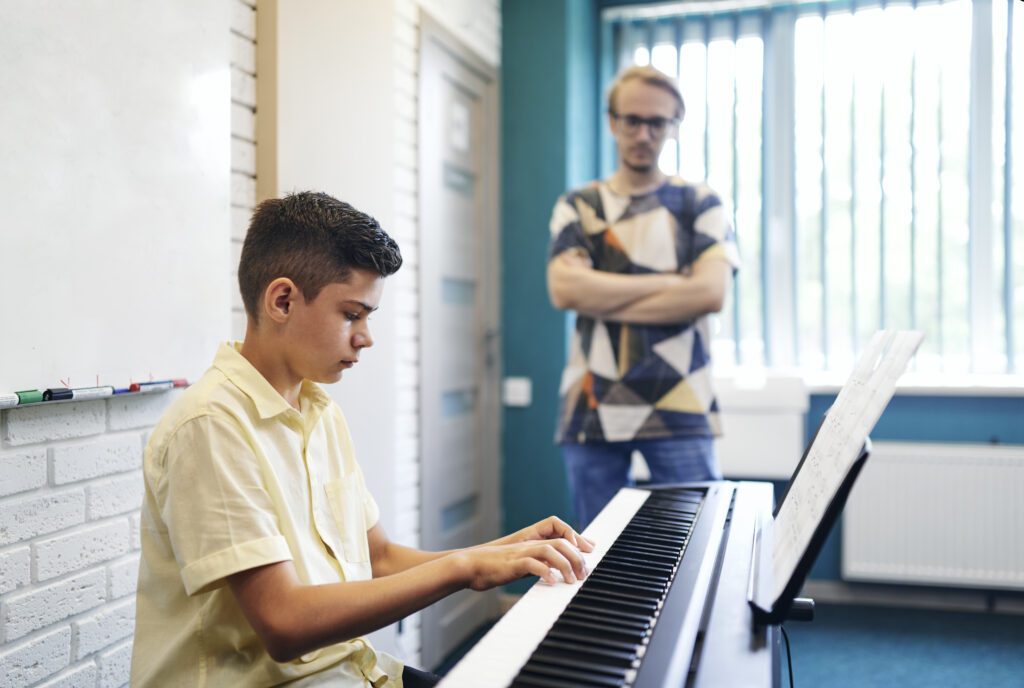How to Choose the Right Teacher for Your One-on-One Music Lessons
Choosing the Right Teacher for Your One-on-One Music Lessons. A great teacher not only helps you learn techniques but also inspires, challenges, and motivates you. Whether you are a beginner or an advanced student, the right mentor will make learning enjoyable and productive.
In today’s digital world, where online music lessons have become more accessible than ever, selecting the perfect teacher can feel overwhelming. With so many instructors available, how do you determine which one is the best fit for you?
This guide will help you understand the key factors to consider when choosing the right teacher for your one-on-one music lessons, ensuring a smooth and fulfilling learning experience.
1. Define Your Musical Goals

Before searching for a teacher, it’s essential to define what you want to achieve with your music lessons. Your goals will determine the type of teacher you need.
- Beginner learners may need an instructor who specializes in foundational skills.
- Aspiring professionals might prefer a teacher with experience in advanced techniques and performance.
- Students preparing for certifications (e.g., Trinity College London exams) require structured guidance.
- Casual learners might prioritize a fun and flexible learning experience.
Clearly outlining your objectives will help you filter out teachers who don’t align with your expectations and find the perfect match.
2. Check the Teacher’s Qualifications and Experience

A teacher’s credentials provide insight into their expertise. Look for:
- Educational background – Have they studied music professionally? Do they have formal training?
- Certifications – If you’re preparing for structured music exams (e.g., Trinity College London, ABRSM), choosing a certified teacher is essential.
- Performance experience – A teacher with real-world performance experience can provide valuable insights into stage presence and musical expression.
- Years of teaching experience – An experienced teacher is likely to have refined their teaching methods to accommodate different learning styles.
It’s not just about degrees or diplomas—practical teaching experience and adaptability matter just as much.
3. Understand Their Teaching Style and Approach

Every student learns differently, so it’s important to find a teacher whose teaching style matches your learning preferences.
- Structured & methodical teachers focus on music theory, technique, and systematic progression.
- Creative & expressive teachers encourage experimentation and improvisation.
- Strict & disciplined teachers push students to master every detail, which is great for competitive learners.
- Relaxed & flexible teachers make lessons more interactive and enjoyable, ideal for casual learners.
A good teacher adapts their approach based on the student’s progress. The right balance between discipline and creativity ensures continuous improvement without frustration.
4. Look for Flexibility and Scheduling Options

If you have a busy schedule, you need a teacher who can accommodate your availability. Online music lessons provide more flexibility than in-person classes, but even then, it’s important to check:
- Lesson rescheduling policies – Can you reschedule if you miss a class?
- Availability for extra sessions – If you need additional guidance before a performance or exam, can they provide extra support?
- Pacing of lessons – Do they adjust to your learning speed, or do they follow a strict syllabus?
A teacher who offers personalized lesson plans and adjusts to your progress will keep you engaged and help you stay on track.
5. Read Reviews and Testimonials

One of the best ways to gauge a teacher’s effectiveness is through student reviews and testimonials.
- Check the teacher’s website, Google reviews, or social media pages.
- Look for feedback on teaching methods, personality, and effectiveness.
- If you’re enrolling in an online music academy, ensure they have a track record of successful students.
Tip: Avoid teachers with overwhelmingly negative reviews or no reviews at all. A well-reputed teacher should have positive student experiences to showcase.
6. Take a Trial Lesson Before Committing

Many teachers offer a first trial lesson, which is a great way to:
- Assess their teaching style – Do they explain concepts clearly?
- See if they motivate you – Are they encouraging and supportive?
- Observe their patience – Do they guide you through mistakes constructively?
- Check lesson structure – Is the session well-organized and engaging?
A trial lesson helps you decide if the teacher is a good fit before making a long-term commitment.
7. Evaluate the Learning Materials and Resources

A good teacher provides structured learning materials, including:
- Sheet music and notations
- Personalized practice exercises
- Recorded lessons for revision
- Online tools and apps for practice
If you’re learning online, ensure the teacher uses high-quality materials that complement your learning style.
8. Consider Personality and Communication Skills

Beyond skill and experience, a teacher’s personality plays a huge role in your learning experience.
- Are they patient and encouraging?
- Do they explain things clearly?
- Do they listen to your concerns and adapt accordingly?
A teacher-student connection built on trust and encouragement makes lessons more enjoyable and effective.
9. Assess Pricing and Value for Money

Music lessons are an investment in your growth, so consider:
- The cost per session and whether it fits your budget.
- Whether the price matches the teacher’s experience and credentials.
- Additional fees for lesson materials, recordings, or practice sheets.
Remember: The most expensive teacher isn’t always the best, but extremely cheap lessons may indicate a lack of experience or quality.
10. Trust Your Instincts

After considering all these factors, trust your intuition.
- Do you feel comfortable with the teacher?
- Are you excited to continue learning from them?
- Do you feel they genuinely care about your progress?
If your trial lesson was enjoyable and you felt motivated, chances are you’ve found the right teacher!
Conclusion
Choosing the right teacher for your one-on-one music lessons is a crucial step toward mastering your instrument and developing a love for music.
- To summarize, when selecting a teacher:
- Define your goals and choose a teacher who aligns with them.
- Check their experience and qualifications to ensure they’re the right fit.
- Find a teaching style that matches your learning preference.
- Ensure flexibility and scheduling suit your routine.
- Read reviews and testimonials to verify their reputation.
- Take a trial lesson to see if they’re the right match.
- Evaluate learning materials and resources.
- Assess their personality and communication skills for a positive experience.
- Consider pricing and value before committing.
By following these steps, you’ll find a teacher who not only helps you improve but also inspires you to keep learning and growing as a musician.








